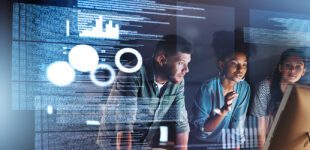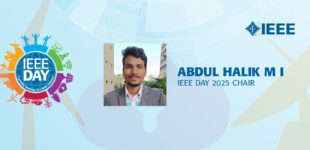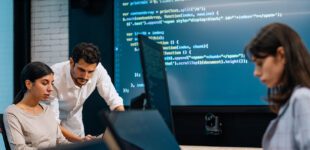August 6, 2020
This is the third in a series of articles highlighting new tools and resources offered by IEEE in support of the Open Science movement.
COVID-19 isn’t stopping technologists from designing research and dataset projects — it’s actually driving the innovation of new and exciting ways for collaboration — and IEEE DataPort is helping them along the way. IEEE DataPort is an accessible online data platform that allows users to store, search, access and manage datasets up to 2TB across a broad scope of topics. This IEEE platform also helps technologists analyze datasets while supporting Open Data initiatives that keep referenceable data available for reproducible research.
We connected with three technologists currently using IEEE DataPort to learn how the platform has helped them move forward with their data collection and research.
1. Research Tracks COVID-19 Real-Time Communications
Rabindra Lamsal has released five sets of data to IEEE DataPort, with the majority focused on studying how much real-time information and language around the pandemic is being used on the social media platform, Twitter.
“Out of these five, Coronavirus (COVID-19) Tweets Dataset [1] and Coronavirus (COVID-19) Geo-tagged Tweets Dataset [2] have more than 59,000 and 12,000 accesses respectively,” says Lamsal. “Both of these datasets contain tweet IDs and respective sentiment scores for each tweet ID. These datasets are being used by thousands of technical and non-technical (social science) researchers worldwide.”
Lamsal chose IEEE DataPort because, “I strongly support the idea of having healthy communication with the dataset owner to understand the data completely. And I find IEEE DataPort is nailing this point.”
2. Datasets for Cybersecurity of IoT Networks
Hyunjae Kang is working on research to detect IoT intrusions by analyzing network packets.
“In order to conduct the research, it was necessary to collect packets generated by the actual IoT device, as well as packets generated during the process of attacking the devices,” says Kang. “Ultimately, the dataset was used to extract features from traffic and create a deep-learning based detection model.”
Kang chose DataPort because, “the formal citation phrase including digital object identifier (DOI) provided by IEEE Dataport helped our project to meet [certain] goals such as number of citation records. As a person who studies security models based on deep learning, we felt that there are [few] open datasets in the field of cybersecurity. We wanted to give a little help to other cybersecurity researchers.”
3. Understanding Diabetic Retinopathy Imaging
Prasanna Porwal created the Indian Diabetic Retinopathy Image Dataset (IDRiD) as a part of a Ph.D. project. Diabetic retinopathy is an eye condition that can cause loss of vision and blindness in people who have diabetes. According to the project description, the dataset can be used “for development and evaluation of image analysis algorithms for early detection of diabetic retinopathy.”
“Relevant data and ground truths are essential for the development, evaluation and comparison of automated algorithms,” says Porwal. “We created this dataset as a first step to attaining our research objectives.”
DataPort has helped Porwal because, “The popularity of IEEE has helped with increasing visibility of our work by making data available to researchers on a common data-sharing platform.”
Learn more about IEEE DataPort and how to get involved.





 Meaningful Momentum or Running in Place?
Meaningful Momentum or Running in Place? AI Through Our Ages
AI Through Our Ages Liquid Infrastructure: Our Planet's Most Precious Resource
Liquid Infrastructure: Our Planet's Most Precious Resource The Impact of Technology in 2025
The Impact of Technology in 2025 Quantum and AI: Safeguards or Threats to Cybersecurity?
Quantum and AI: Safeguards or Threats to Cybersecurity? Why AI Can't Live Without Us
Why AI Can't Live Without Us Bits, Bytes, Buildings and Bridges: Digital-Driven Infrastructure
Bits, Bytes, Buildings and Bridges: Digital-Driven Infrastructure Impact of Technology in 2024
Impact of Technology in 2024 Emerging AI Cybersecurity Challenges and Solutions
Emerging AI Cybersecurity Challenges and Solutions The Skies are Unlimited
The Skies are Unlimited Smart Cities 2030: How Tech is Reshaping Urbanscapes
Smart Cities 2030: How Tech is Reshaping Urbanscapes Impact of Technology 2023
Impact of Technology 2023 Cybersecurity for Life-Changing Innovations
Cybersecurity for Life-Changing Innovations Smarter Wearables Healthier Life
Smarter Wearables Healthier Life Infrastructure In Motion
Infrastructure In Motion The Impact of Tech in 2022 and Beyond
The Impact of Tech in 2022 and Beyond Cybersecurity, Technology and Protecting Our World
Cybersecurity, Technology and Protecting Our World How Technology Helps us Understand Our Health and Wellness
How Technology Helps us Understand Our Health and Wellness The Resilience of Humanity
The Resilience of Humanity Harnessing and Sustaining our Natural Resources
Harnessing and Sustaining our Natural Resources Creating Healthy Spaces Through Technology
Creating Healthy Spaces Through Technology Exceptional Infrastructure Challenges, Technology and Humanity
Exceptional Infrastructure Challenges, Technology and Humanity The Global Impact of IEEE's 802 Standards
The Global Impact of IEEE's 802 Standards Scenes of our Cyber Lives: The Security Threats and Technology Solutions Protecting Us
Scenes of our Cyber Lives: The Security Threats and Technology Solutions Protecting Us How Millennial Parents are Embracing Health and Wellness Technologies for Their Generation Alpha Kids
How Millennial Parents are Embracing Health and Wellness Technologies for Their Generation Alpha Kids Space Exploration, Technology and Our Lives
Space Exploration, Technology and Our Lives Global Innovation and the Environment
Global Innovation and the Environment How Technology, Privacy and Security are Changing Each Other (And Us)
How Technology, Privacy and Security are Changing Each Other (And Us) Find us in booth 31506, LVCC South Hall 3 and experience the Technology Moon Walk
Find us in booth 31506, LVCC South Hall 3 and experience the Technology Moon Walk Virtual and Mixed Reality
Virtual and Mixed Reality How Robots are Improving our Health
How Robots are Improving our Health IEEE Experts and the Robots They are Teaching
IEEE Experts and the Robots They are Teaching See how millennial parents around the world see AI impacting the lives of their tech-infused offspring
See how millennial parents around the world see AI impacting the lives of their tech-infused offspring Take the journey from farm to table and learn how IoT will help us reach the rising demand for food production
Take the journey from farm to table and learn how IoT will help us reach the rising demand for food production Watch technical experts discuss the latest cyber threats
Watch technical experts discuss the latest cyber threats Explore how researchers, teachers, explorers, healthcare and medical professionals use immersive technologies
Explore how researchers, teachers, explorers, healthcare and medical professionals use immersive technologies Follow the timeline to see how Generation AI will be impacted by technology
Follow the timeline to see how Generation AI will be impacted by technology Learn how your IoT data can be used by experiencing a day in a connected life
Learn how your IoT data can be used by experiencing a day in a connected life Listen to technical experts discuss the biggest security threats today
Listen to technical experts discuss the biggest security threats today See how tech has influenced and evolved with the Games
See how tech has influenced and evolved with the Games Enter our virtual home to explore the IoT (Internet of Things) technologies
Enter our virtual home to explore the IoT (Internet of Things) technologies Explore an interactive map showcasing exciting innovations in robotics
Explore an interactive map showcasing exciting innovations in robotics Interactively explore A.I. in recent Hollywood movies
Interactively explore A.I. in recent Hollywood movies Get immersed in technologies that will improve patients' lives
Get immersed in technologies that will improve patients' lives